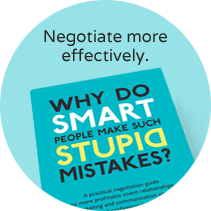Insights

Holding your fees in tough times
Your fees and rates are probably under more pressure than ever. It is highly likely you are not charging high enough fees compared to the value that your client derives. Many businesses under-charge in relation to the end result the client enjoys. You can easily drop your prices however, that is a one way street. It is easy to come down in price and much harder to go up. There are specific strategies that will help you hold and even increase your fees whether in tough times or normal times (whatever that means!)
Take time to prepare for price discussions. Do not just turn up and hope for the best. Hope is not a strategy. It is rarely “all about price”. Your client’s decision to purchase will be based on a variety of reasons. Understand those reasons and their importance to their decision. Your fee should be based on the difference you make. Aim slightly higher than you feel comfortable with. Understand how you will justify your fee level. Anticipate their likely price challenge(s) and plan how you will respond. Ensuring your level of confidence is high should be a key part of your preparation. Confidence in your price is vital. Never apologise for your price or fee. The first person you need to sell your price to is… YOU. Say your price slowly, clearly and confidently. Put yourself in their shoes and see the deal from their perspective. What is most important to them?
What is your pricing strategy? Do you have one? Or do you just charge the ‘market rate’? Or cost plus a mark up? Do you charge an hourly or daily rate? Or do you charge value based fees? The price you charge your client in 2011 will largely dictate the price you will be charging in 2012, 2013 and even 2014. You are not just providing a price today! Today’s price has long term implications for your pricing for that client.
Clients say they want price reduction. In reality they want ‘risk reduction’. They want the right quality, they want value for money. It is a basic human need to ensure we don’t get a bad deal. Don’t immediately believe clients when they tell you that you are expensive. Often it is a knee-jerk reaction by them designed to elicit a price reduction in response. It is part of your client’s job to challenge your price. It is part of your job to know how to respond to that challenge.
Do you accept your client’s brief at face value? Or do you ask high value incisive questions to turn an average brief into a great brief – this can give you a strong competitive edge. “Garbage in, garbage out” if you accept and work on a poor quality brief it is likely your output and response will not be as good as they should be decreasing your likelihood of winning the business and ability to justify premium fee levels.
Really understand the value that you provide for your clients. Do your clients value what you do? Do you? I see in my workshops many people too focused on ‘implementation’ and ‘delivery’ and not enough thinking about the end result they provide to their client. Once you know your true value to your clients you can charge more realistic levels, assuming you provide a high value. Your expertise is probably a vital part of your value. How does your expertise help your clients? Can you become a ‘thought leader’ in your field? Someone who is seen as the recognised expert. This can support your pricing rationale and strategy.
The more your business is viewed as similar or the same as your competitors the harder it is to charge a premium price. Work on your differentiation in ways your clients value. Find points of real distinctiveness. How compelling is your answer to the question “Why should I buy from you?” Or is your answer a cliché, platitude or generic truism?
Do you say ‘yes’ too readily? Your preparedness to say ‘no’ will substantially increase your ability to hold and increase your fees. The challenge is to ‘disagree without being disagreeable’. How comfortable are you pushing back?
What are the dangers of not increasing your fees? Firstly as your costs increase unless you are finding ways to work more efficiently, your profitability will decline. The client will think you are weak and your self-belief will decline. In a year’s time it will be a bigger problem unless you take action now. Morale in your business is likely to decline as teams who work on unprofitable clients are often de-motivated.
The dangers of increasing your fees may be that you put your fees under the spotlight with the client and may prompt the client to price compare and benchmark you. You could lose a client.
So only increase your fees if you are delivering immense value, are highly differentiated, provide outstanding results and offer true expertise.
Generally the best place to start if you want to increase your fees is with new clients. Test out a higher rate and gauge their reaction. Increase your fee when you have recently won some new business and you are feeling more bullish. Increase fees when your confidence is on the rise.
With existing clients you must increase fees on a regular basis i.e. annually. Increase fees with existing clients, one at a time. Start with your least profitable client and increase their fees. Ask your client questions casually to help assess how you are perceived and valued by them.
Choose your timing carefully. There never is a right time to increase fees. There are just some times which are better than others.
Rehearse with a colleague how you will raise the subject of a fee increase with your client. Anticipate the client’s likely response and plan what you will say.
So how will you hold your fees in tough times? Or maybe even increase them? Or will you drop your fees, work even longer hours than you do now and wonder why you are exhausted and your profitability is declining?

